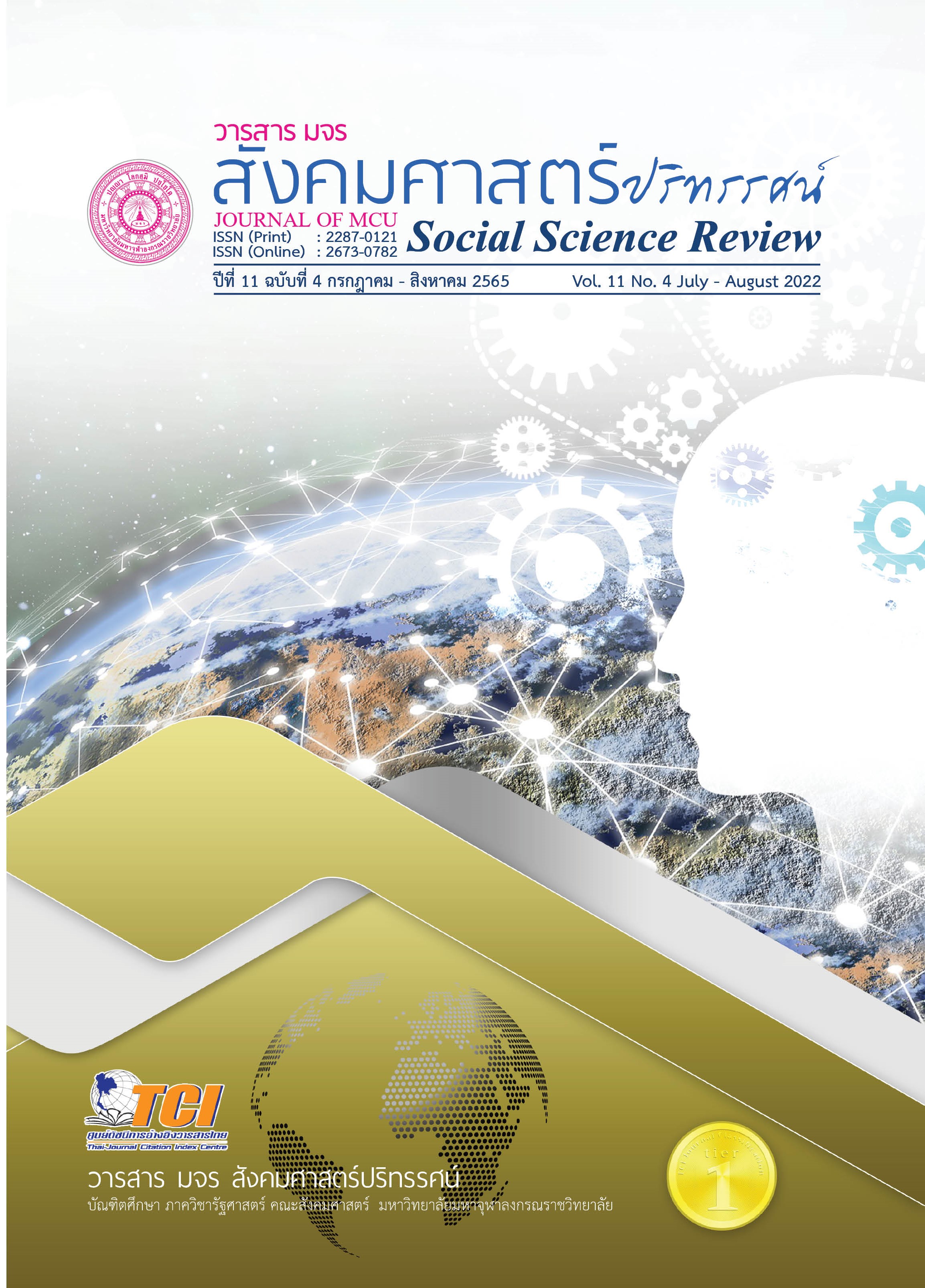การบริหารจัดการการท่องเที่ยวเชิงเกษตรชุมชน จังหวัดสระแก้ว
คำสำคัญ:
การจัดการ การท่องเที่ยวเชิงเกษตรบทคัดย่อ
การวิจัยนี้มีวัตถุประสงค์ เพื่อศึกษาการบริหารจัดการ และเสนอแนะแนวทางการบริหารจัดการท่องเที่ยวเชิงเกษตรชุมชน จังหวัดสระแก้ว โดยใช้วิธีการวิจัยเชิงคุณภาพ ผู้ให้ข้อมูลสำคัญ ได้แก่ ผู้นำชุมชน เกษตรกร ผู้แปรรูปผลิตภัณฑ์เกษตร ผู้ให้บริการโฮมสเตย์ ผู้ให้บริการการท่องเที่ยว ผู้ทรงคุณวุฒิ และผู้บริหารที่มีส่วนเกี่ยวข้องในจังหวัดสระแก้ว 60 คน เครื่องมือที่ใช้ในการวิจัยคือ แบบสัมภาษณ์เชิงลึกเป็นการสัมภาษณ์แบบกึ่งโครงสร้าง และการประชุมกลุ่มย่อย การวิเคราะห์ข้อมูลโดยใช้เทคนิคการวิเคราะห์เนื้อหา
ผลการวิจัยพบว่า การบริหารจัดการท่องเที่ยวเชิงเกษตรชุมชนบ้านคลองอาราง ประกอบด้วย การบริการการท่องเที่ยว การดึงดูดใจ และการรองรับการท่องเที่ยว การบริหารจัดการส่วนใหญ่เป็นการเกษตรแบบเศรษฐกิจพอเพียง ปลูกพืชผักสวนครัวปลอดสารพิษ แปรรูปผลผลิตทางการเกษตร มีทรัพยากรธรรมชาติที่สำคัญ เช่น ป่าชุมชน บ่อทองโบราณ พืชสมุนไพร และมีโฮมสเตย์ที่มีมาตรฐาน เป็นแบบเครือญาติผ่านผู้นำชุมชน ชุมชนมีความเข็มแข็งในการมีส่วนร่วมกิจกรรมต่าง ๆ ทำให้ได้รับรางวัลมากมายทั้งในระดับหมู่บ้านจนถึงระดับประเทศ แนะแนวการบริหารจัดการท่องเที่ยวเชิงเกษตรชุมชน จังหวัดสระแก้ว ในรูปแบบของ “คณะกรรมการบริหารจัดการการท่องเที่ยวเชิงเกษตรโดยชุมชน” และนำไปสู่การจดทะเบียนวิสาหกิจชุมชนการท่องเที่ยวเชิงเกษตรชุมชน นอกจากนี้เพื่อให้การบริหารจัดการเป็นรูปธรรมและมีผู้รับผิดชอบ บริหารจัดการอย่างยั่งยืนควรกำหนดกลยุทธ์ โครงสร้างองค์การ ระบบ บุคลากร ทักษะในการทำงาน รูปแบบ และค่านิยมร่วมกัน
เอกสารอ้างอิง
กรมการท่องเที่ยว. (2557). คู่มือการตรวจประเมินมาตรฐานคุณภาพแหล่งท่องเที่ยวเชิงเกษตร.กรุงเทพฯ: องค์การสงเคราะห์ทหารผ่านศึกในพระบรมราชูปถัมภ์.
กรมส่งเสริมการเกษตร. (2548). คู่มือการดำเนินงานโครงการส่งเสริมและพัฒนาการท่องเที่ยว ทางการเกษตร ปีงบประมาณ 2545. กรุงเทพฯ: กรมส่งเสริมการเกษตร.
กระทรวงการท่องเที่ยวและกีฬา. (2563). จำนวนและรายได้นักท่องเที่ยวต่างชาติ รายเดือน ปี2559-2562R (ปรับปรุงจำนวนและรายได้ 2562). สืบค้น 25 พฤศจิกายน 2564, จาก https://www.mots.go.th/more_news_new.php?cid=585.
การท่องเที่ยวแห่งประเทศไทย (2562). รายงานประจำปี 2562. สืบค้น 6 มกราคม 2563, จาก https://www.mots.go.th/download/AnnualReport/AnnualReport2562 compressed.pdf
ถวิลวดี บุรีกุล. (2550). การบริหารราชการจังหวัดแบบมีส่วนร่วม สำหรับบุคลากรภาครัฐ และระดับจังหวัด. กรุงเทพฯ : สำนักงานคณะกรรมการพัฒนาระบบราชการ.
องค์การบริหารการพัฒนาพื้นที่พิเศษเพื่อการท่องเที่ยวอย่างยั่งยืน (องค์การมหาชน). (2558). การท่องเที่ยวโดยชุมชน. กรุงเทพฯ: โคคูนแอนด์โค.
Cohen, J. M., & Uphoff, N. T. (1981). Rural Development Participation: Concept and Measures for Project Design Implementation and Evaluation. Ithaca, NY: Rural Development Committee Center for International Studies, Cornell University.
Lamb, R. (2008). Through Agro-Tourism: A Case Study of Bhakapur, Nepal. The Journal of Agriculture and Environment, 12(1), 56-66.
Mill, R. C. & Morrison, A. M. (1985). The tourism system: An introductory text. New Jersey: Prentice-Hall.
Tomas, P. J. et al. (1982). In Search of Excellence: Lessons from America’s Best-Run Companies. New York: Harper & Row Publishers.
World Tourism Organization (UNWTO). (2008). Sustainable development of tourism. Retrieved April 2, 2019, from http://sdt.unwto.org/en/content/ about-us-d
ดาวน์โหลด
เผยแพร่แล้ว
รูปแบบการอ้างอิง
ฉบับ
ประเภทบทความ
สัญญาอนุญาต
ลิขสิทธิ์ (c) 2022 วารสาร มจร สังคมศาสตร์ปริทรรศน์

อนุญาตภายใต้เงื่อนไข Creative Commons Attribution-NonCommercial-NoDerivatives 4.0 International License.
เพื่อให้เป็นไปตามกฎหมายลิขสิทธิ์ ผู้นิพนธ์ทุกท่านต้องลงลายมือชื่อในแบบฟอร์มใบมอบลิขสิทธิ์บทความให้แก่วารสารฯ พร้อมกับบทความต้นฉบับที่ได้แก้ไขครั้งสุดท้าย นอกจากนี้ ผู้นิพนธ์ทุกท่านต้องยืนยันว่าบทความต้นฉบับที่ส่งมาตีพิมพ์นั้น ได้ส่งมาตีพิมพ์เฉพาะในวารสาร มจร สังคมศาสตร์ปริทรรศน์ เพียงแห่งเดียวเท่านั้น หากมีการใช้ภาพหรือตารางหรือเนื้อหาอื่นๆ ของผู้นิพนธ์อื่นที่ปรากฏในสิ่งตีพิมพ์อื่นมาแล้ว ผู้นิพนธ์ต้องขออนุญาตเจ้าของลิขสิทธิ์ก่อน พร้อมทั้งแสดงหนังสือที่ได้รับการยินยอมต่อบรรณาธิการ ก่อนที่บทความจะได้รับการตีพิมพ์ หากไม่เป็นไปตามข้อกำหนดเบื้องต้น ทางวารสารจะถอดบทความของท่านออกโดยไม่มีข้อยกเว้นใดๆ ทั้งสิ้น





